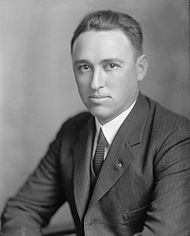Gordon Browning | |
|---|---|
 | |
| 38th Governor of Tennessee | |
| In office January 16, 1949 – January 15, 1953 | |
| Preceded by | Jim Nance McCord |
| Succeeded by | Frank G. Clement |
| In office January 15, 1937 – January 16, 1939 | |
| Preceded by | Hill McAlister |
| Succeeded by | Prentice Cooper |
| Member of the U.S. House of Representatives from Tennessee's 7th district | |
| In office March 4, 1933 – January 3, 1935 | |
| Preceded by | Willa Eslick |
| Succeeded by | Herron C. Pearson |
| Member of the U.S. House of Representatives from Tennessee's 8th district | |
| In office March 4, 1923 – March 3, 1933 | |
| Preceded by | Lon Scott |
| Succeeded by | Jere Cooper |
| Personal details | |
| Born | November 22, 1889 Carroll County, Tennessee, U.S. |
| Died | May 23, 1976 (aged 86) Huntingdon, Tennessee, U.S. |
| Resting place | Oak Hill Cemetery, Huntingdon, Tennessee |
| Political party | Democratic |
| Spouse |
Ida Leach (m. 1920) |
| Profession | Attorney |
| Awards | |
| Military service | |
| Allegiance | |
| Branch/service | |
| Years of service | 1917–1919 1943–1947[2] |
| Rank | |
| Battles/wars | World War I World War II |
Gordon Weaver Browning (November 22, 1889 – May 23, 1976) was an American politician who served as the 38th governor of Tennessee from 1937 to 1939, and again from 1949 to 1953. He also served six terms in the U.S. House of Representatives, from 1923 to 1935, and was Chancellor of Tennessee's Eighth Chancery District in the 1940s. As governor, he stabilized state finances, doubled the state's mileage of paved roads, and enacted legislation to curb voter fraud. His victory in the hard-fought 1948 gubernatorial campaign helped break the power of Memphis political boss E. H. Crump.[3]
In the years following World War II, Browning served in the Allied occupational government in Germany, and was a civil affairs advisor on the staff of General Dwight D. Eisenhower.[2]
- ^ Carroll County Historical Society, Carroll County, sequicentennial booklet printed by the McKenzie Banner, 1972, pp. 33-36.
- ^ a b Gordon Browning, Biographical Directory of the United States Congress. Retrieved: 12 December 2012.
- ^ Fred Rolater, "Gordon Weaver Browning," Tennessee Encyclopedia of History and Culture, 2009. Retrieved: 12 December 2012.